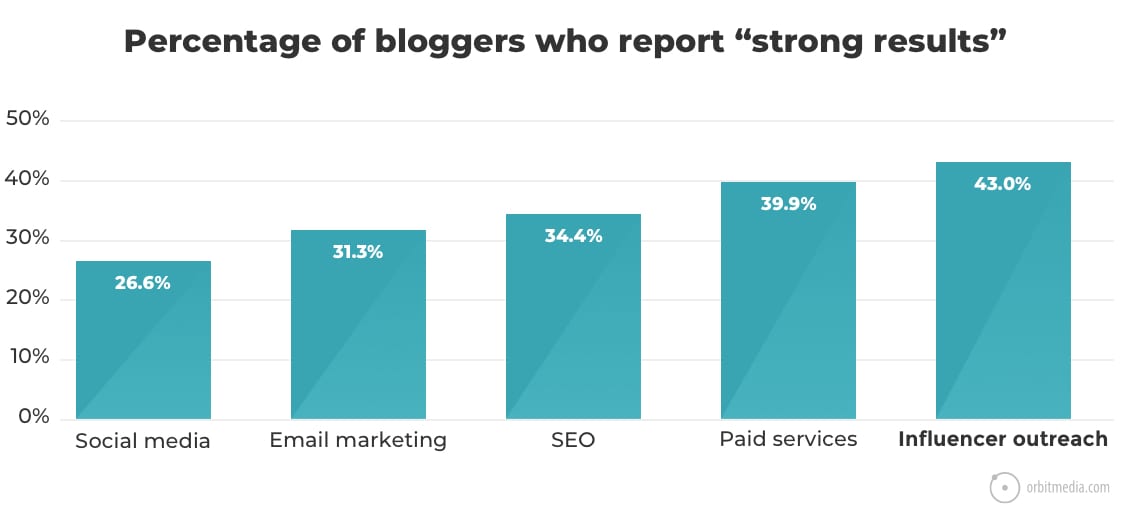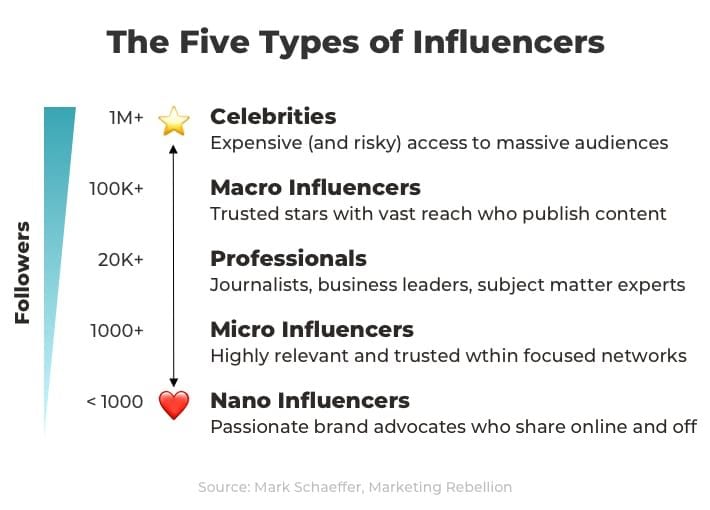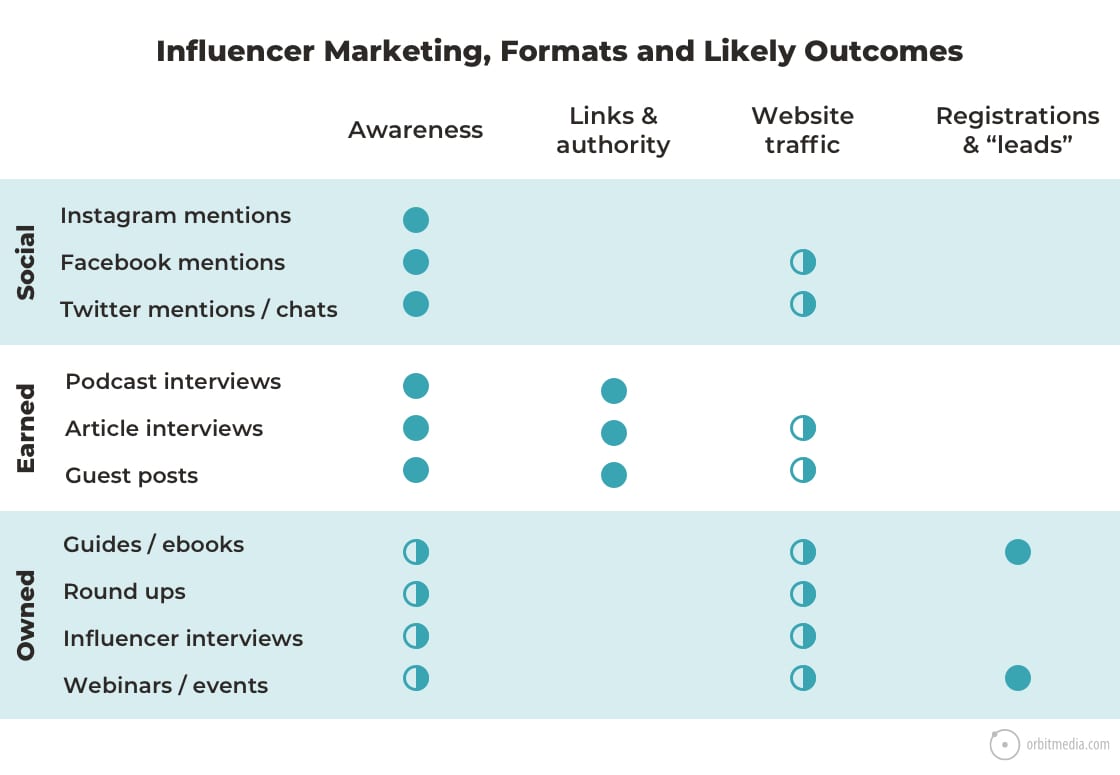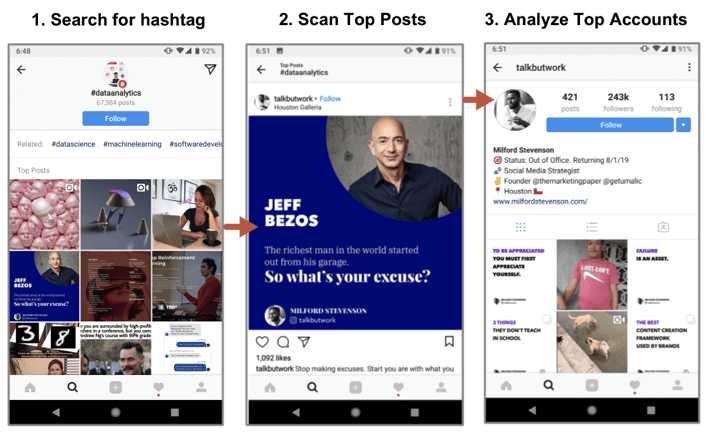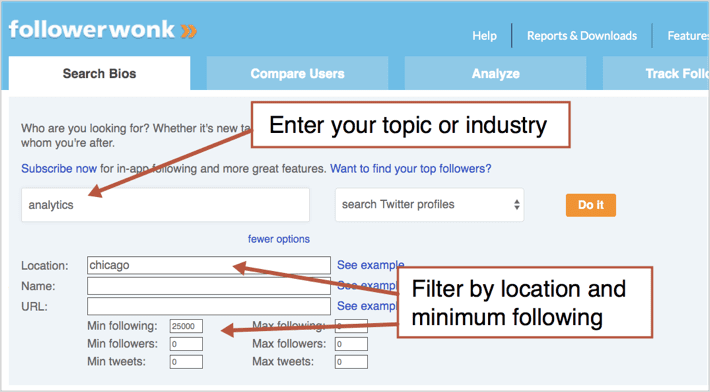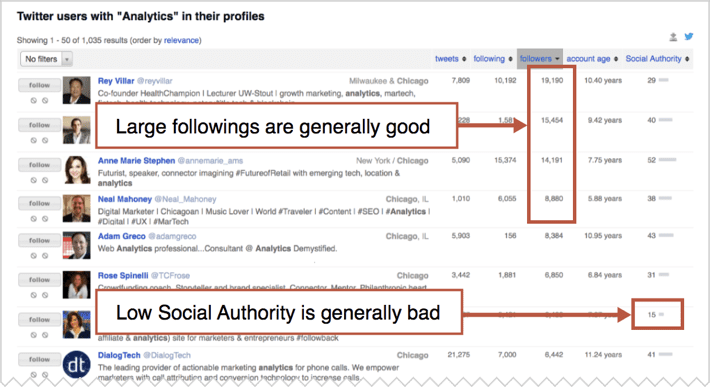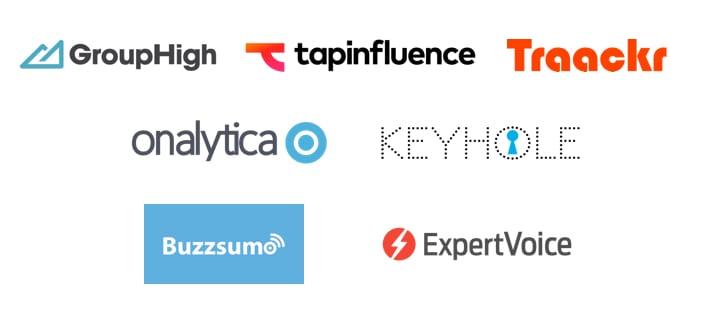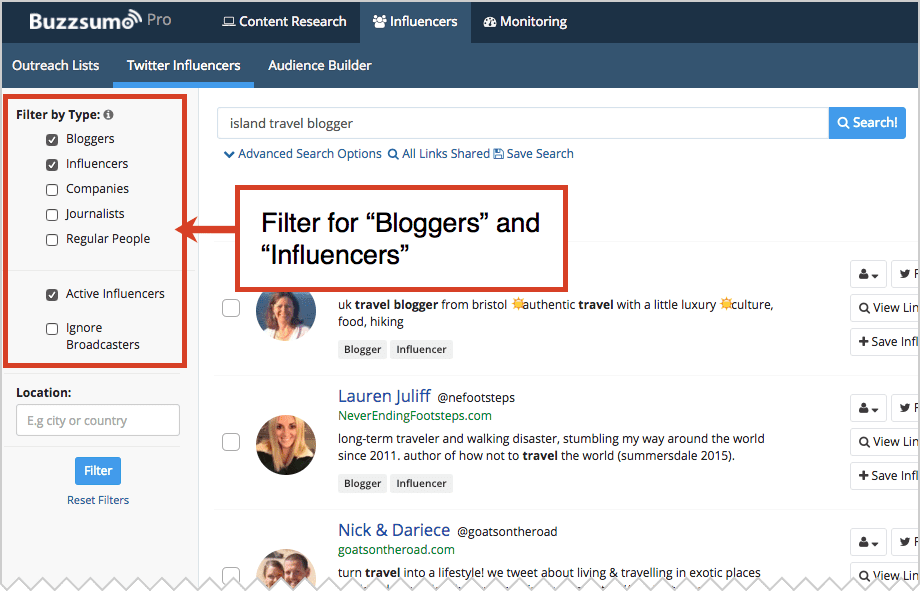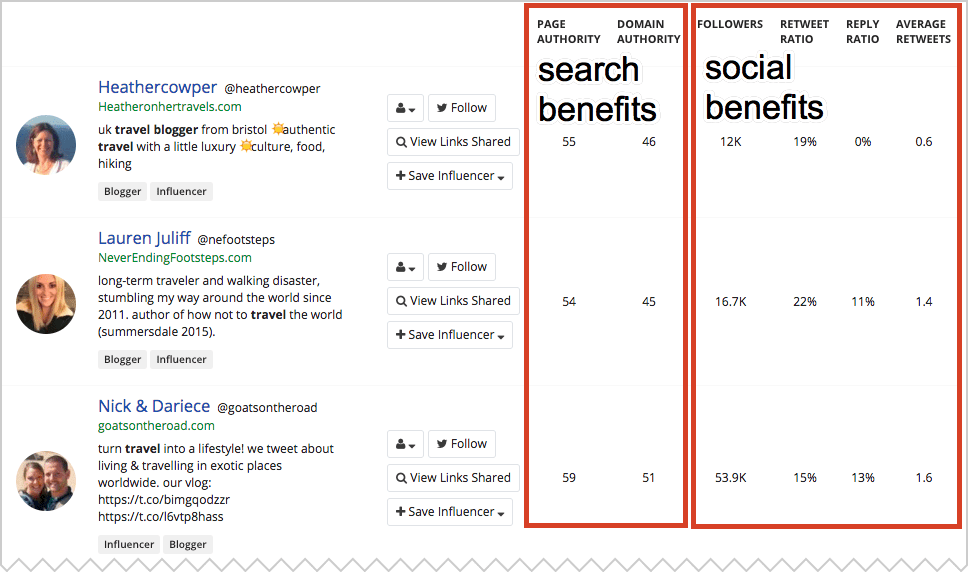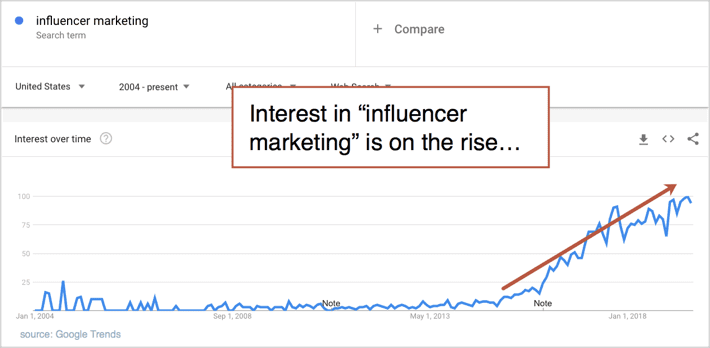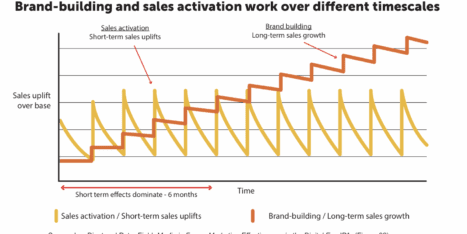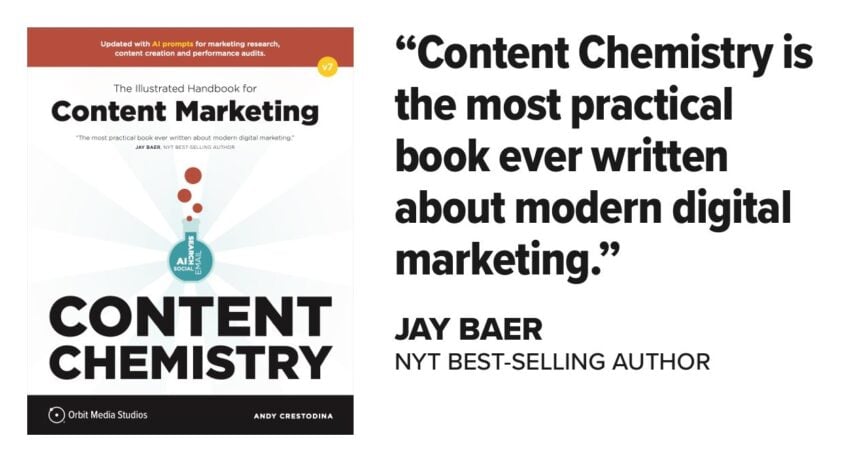Some marketers are stranded on islands. They put messages in bottles and throw them into the sea, hoping something will come back. They work alone.
Other marketers are connected. They reach out to others, share ideas, collaborate, create and promote content together.
If you are in that second group, then you’ve discovered the secret power of influencer marketing. You’ve learned that collaboration leads to better content, better reach, more traffic and long-lasting relationships.
You are also more likely to report strong results from your content marketing.
If you haven’t joined the collaborative content party yet, this post will get you started. This is step one: how to find influencers for your brand. More specifically, how to use social media to find influencers in your niche.
Before we dig in and learn how to find these key influencers, let’s define the term.
What’s influencer marketing? What’s an influencer?
Here’s the definition of influencer marketing:
Influencer marketing is focused on the key people who have built the audience you want to reach. The goal is to connect with these influencers and collaborate, allowing you to borrow that audience in a sensitive and considerate way.
So an influencer is someone who is known and trusted by your target audience on topics that are relevant to your business.
Yes, there are celebrities in your niche. But a smart influencer marketer looks past these to the broader range of writers, editors that your audience reads. And the best influencer marketers understand that really anyone who talks about your business or shares your content has influence.
Mark Schaefer lays out five types of influencers in his latest book, Marketing Rebellion. If you don’t have it yet, stop reading this article and go buy the book. It has a short, enlightening chapter that explains the different types of influencers beautifully. We’ve taken the liberty to turn it into a little diagram.
The point is that influencer is everywhere and it’s rarely a good idea to chase fame. Pay attention to the influencers farther down the spectrum. You’ll find people highly relevant within smaller communities and can be powerful advocates in word of mouth marketing. Social media pros know this well.
Who should I be looking for?
There are three main criteria for picking influencers to collaborate with. Here we lay them out with expert tips for each:
1. Engaging: Is this person generating conversation, triggering shares, creating compelling content?
Do you see signs that they are trusted by their readers and followers? Are they writing for authoritative publications? Are they creating high-quality content?
 |
Peg Fitzpatrick, pegfitzpatrick.com“Look for great visual storytellers! Someone that creates unique and engaging content. All the algorithms point to social signals and conversations these days. Are people responding to their posts beyond a quick like?” |
2. Relevant: Will it be an effective collaboration?
Is this person known by my audience? Do they have a social media following? Are they likely to share or promote content we create together? Do they create content in my niche?
 |
Neal Schaffer, nealschaffer.com“Ask yourself: If this influencer talks about my business on their social media profile, would it make sense? Does it align with their profile? Does it align with what the influencer regularly publishes? And finally, does similar content posted by that influencer get decent engagement?” |
3. Collaborative: Is this person likely to work with me?
Will this person even respond if I reach out? Are they likely to accept my invitation to collaborate? Will I have to pay them?
 |
Gini Dietrich, Spinsucks.com“Most executives want big followers and big names. But those influencers are rarely the ones who affect change or drive sales. (Unless, of course, you’re Stella McCartney and Meghan Markle wears you. Then all bets are off.) But the truth is, unless the influencer IS Meghan Markle, it’s far better to go with someone who already uses your products or services and is passionate about it.” |
Influencer collaborations, channels, formats and likely outcomes
There are many ways to play, so keep your eye on the prize. Align the influencer and their specific relevance with the outcome you seek. Here is a breakdown of influencer marketing approaches, formats and outcomes.
- Social mentions tend not to drive much traffic
This is especially true on Instagram where links are hard to find. When high-level awareness is the goal (common in B2C marketing) these collaborations are most effective. - Earned media is your content on other websites.
It puts you in front of a new audience. It also leads to links which we’ll talk about more in just a minute. Referral traffic from guest posts is hit or miss. It all depends on the popularity of the publication, the piece and the placement of the link. - Owned media is on your website.
It’s all about spotlighting the influencer in your content. It only increases traffic if co-promotion with the influencer (often on social and email marketing) gets potential visitors to click. Anything that requires registration has the magical outcome of growing your list.
The case for content creators …and SEO
Here is the case for search over social, for earned over owned. The social benefits of influencer marketing are short-lived. The search benefits are durable.
If a social media influencer shares your content, the lifespan of that social post is measured in hours. If you do get a traffic boost, it will be over before the day is done.
If a content creator mentions you on their website, that mention (and link) passes a bit of authority from their website to yours. And it’s this authority that helps your website rank.
PR professionals are influencer marketers who target journalists. Some social media marketers do blogger relations to win referral traffic. Anyone who creates content may create links. That’s bloggers, editors, columnists and even podcasters.
For a detailed explanation of the specifics, read our guide to influencer marketing for SEO.
Warning: Never buy links.
Paying people to link to you for the sake of search engine rankings is a violation of Google’s Webmaster Guidelines. This is a kind of “link spam” and it’s considered both unethical and risky. Influencer marketing is first and foremost about people and content, not links.
With relevance, content, formats and location in mind, let’s go find some influencers!
How to find influencers on social media in any niche
Good news! You’re sitting in front of the worlds greatest phonebook: social media. Content creators who are influential within your niche are easy to find on social media. Here are the five main ways:
- Search hashtags
- Social media advanced search tools
- Free social media tools
- Paid influencer marketing tools
- Search engines
And here are examples of how to use each.
1. Search hashtags
Social networks have native search tools which naturally surface influential accounts. Here’s an example of how to find influencers on Instagram. IG is a super crowded network for lifestyle, fashion and travel, but reasonable for almost anything. To find influencers in your industry, just pick a relevant phrase and search.
For our example, we’ll use Analytics. We’re looking for people influential on the topic of Google Analytics.
Search for the phrase “analytics” and you’ll see a list of hashtags and accounts personalized for you, based on your location and activity. The most popular hashtags are rarely the best. Pick one more specific and dig in.
Top posts show the post engagement. Tap a few. Who posted it? Review their account. Are their other posts relevant to your content and business? Is their audience engaging with the content? Are they engaging with their audience?
2. Advanced search tools
Facebook, Twitter and LinkedIn all have advanced search tools. These help you dig deeper faster. For this example, we’ll use LinkedIn.
Search for your topic or niche. The search results page will give you the opportunity to filter for people. Then click “All Filters” and start drilling down. Here are a few ways to narrow the search:
- Add your industry
- Add your city to find local influencers
- Add “editor” or “blogger” to the title field to find content creators
Search results will include influencers you aren’t connected with yet. Don’t hesitate to send a connection request with a personal note. If you want to warm up the conversation first, engage with them on another social network first, then send a connection request.
3. Free social media search tools
This is great for Twitter. Twitter is a challenging way to grow as an influencer but a fast way to find influencers.
The Twitter Advanced Search Tool is good, but the search results aren’t sortable. So most marketers skip this and use other Twitter search tools, such as FollowerWonk. Here’s how.
In the Search Bios tab, select “more options” for the advanced search options. Just enter your niche or industry into the search field. Add “blogger” if you’re looking for SEO benefits.
ProTip: Be specific to dig deeper into your niche. Rather than “travel” or “cars” try using “island travel” or “family cars.”
Enter a minimum number of followers (probably 10,000 for most industries or a few as 1,000 for specific niches).
Now you’ll be looking at a list of people who are likely influential within the niche. They’re sorted by the size of their followings.
More followers may not mean more influence. It’s easy to get lots of followers without influencing anyone. Look at the Social Authority column. Low authority means the account is less likely to engage and drive traffic.
First you’ll need to scan past the company accounts. Look closely at the more human accounts that look interesting. Are they sharing lots of content? Are they interacting with other people? Are they active on other networks?
4. Paid influencer marketing tools
There are lots of power tools you can use to both find influencers and track your interactions with them. These tools have excellent search features. Here are some that we know to be effective.
These can help you find niche influencers to collaborate with by filtering and sorting in ways that aren’t possible with free tools. Let’s try BuzzSumo.
From the influencers tab, select the filters for “bloggers” and “influencers.” It’s very useful to remove companies!
Now you’re looking at a list of niche influencers complete with data about followings, retweet ratios, reply ratios. At a glance, you can see who is likely to interact on social media.
But domain authority data is also here. A higher number means a bigger benefit to your search rankings if the blogger mentions you and links to your site from their blog.
This report also gives you quick access to the content they’re sharing. Dig in and pick the influencers you like best, then you can add them to an outreach list for managing your contact and collaboration.
5. Search engines
This final source of influencers comes from Neal Schaffer.
 |
Neal Schaffer, nealschaffer.com“You can find lists of industry influencers in search engines, then combine them into one big list, and then seeing who appears on a majority of these lists. You can also do searches on Twitter for lists of influencers – and Nimble, a social CRM, gives you the ability to download Twitter lists into their CRM, allowing you to streamline the process.“ |
Smart!
Next steps: Approach gradually, then boldly.
Once you’ve built a list of the key leaders in your niche, in a spreadsheet, in an influencer marketing tool or just on paper, it’s time to plan your outreach.
Start slow. Interact with their content. Like and share their work. Then share and add your own thoughts. Or leave a thoughtful comment. Each of these interactions will make you slightly more visible to the influencer.
Related: 35 Ways to Connect with Anyone Online >
Now when the time comes, be bold. Reach out with empathy, with sensitivity and with patience. Be direct and make a specific request. Make it easy for them. Explain the benefit of the collaboration. Want your pitch to stand out? Make it a mini video.
Make it easy for them to decline if the time isn’t right. But keep the conversation going if possible. If you’re patient, generous and considerate, you should be able to build a relationship with just about anyone!
 |
D.P. Knudten, COLLABORATOR creative“Really pay attention, and record on paper, the influencers you respect and follow religiously. You may think your list is unique, but in my experience, it’s not. There are thousands of people just like you that share your taste, quality criteria, and finely attuned ‘influencer BS radar’. If said influencer passes muster with you, it will for them too.“ |
If you’re not making friends, you’re doing it wrong.
Call it influencer marketing, blogger relations or just modern-day PR. Whatever the name, it’s more important, more relevant and more popular than ever. Here’s a handy influencer outreach email template.
It’s not about the size of your following, but the quality of your relationships. These are people who can truly help you. And they’re excited to help you. Why? Because you’ve built a relationship and you are just as motivated to help them. You’re friends.
 |
Dennis Shiao, DNN Software“Make it an everyday habit to build authentic and meaningful relationships with influencers. Because I love to meet people, I engage in this sort of activity all the time. When I do, I’m not thinking about the benefits or results. I’m not thinking about “influencer outreach,” I’m thinking instead about “meeting people.” My motivation is to get to know someone new, someone I may learn from.“ |
Help everyone you can and your marketing support network will grow. You’ll get more done, more efficiently and have more fun doing it. That’s really what influencer marketing is about.
Try it! It will do wonders for the future of your content, your career and your personal life.

